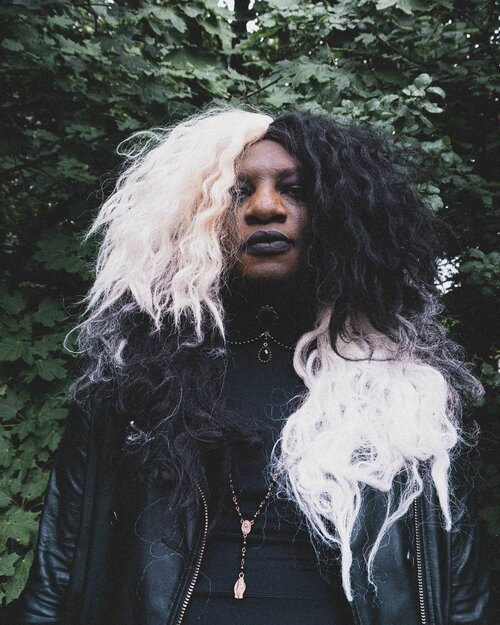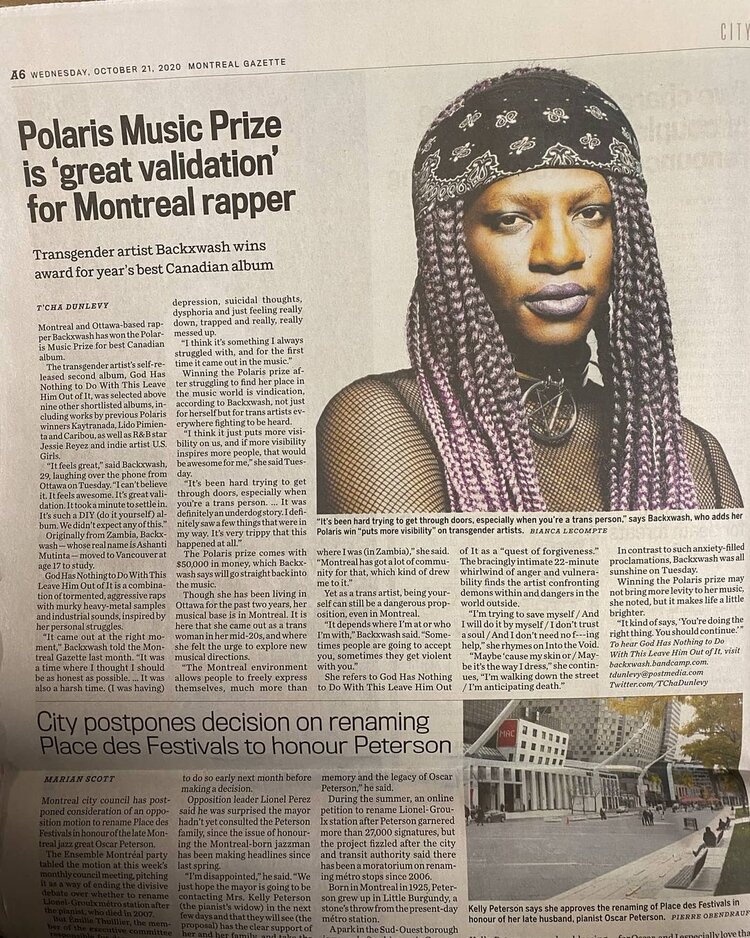

Last Month, CBC hosted a virtual event to honour the winner of the 2020 Polaris Music Prize. The not-for-profit organization annually rewards artists who produce Canadian albums of distinction. Last year, a friend of ours and Issue 02 feature, Haviah Mighty took home the award and used her winnings to help celebrate the vision of 13th Floor. This year’s winner, Backxwash, plans to do the same, using the funding and newly found notoriety to continue to creating polarizing art.
Backxwash, who’s based in Montreal, is an Zambian-Canadian immigrant, who began expressing herself through music at a young age before having to leave it behind out of respect for her parents. As she aged, she grew more independent, and decided to move to Montreal where she felt that she could freely express her sexuality and artistic visions. For a long time, she knew what she wanted to bring to the world of hip hop, but only recently did she find the means to do it. We spoke to Backxwash shortly after the Polaris Music Prize event to discuss her early artistic expressions, and her current award-winning album God Has Nothing To Do With This Leave Him Out Of It.
Backxwash began releasing music for the sole purpose of authentic creation. It’s easy to say a project “doesn’t sound like anything we’ve heard before” but with this this one, that’s actually the case. The brashness and sonics remind us of Yeezy, but the samples are retro, resulting in an album that blends not only genres, but also musical eras. Backxwash produces all of her own music, and has opted to chop up classic/metal rock samples and pair them with drum patterns that are international, and timeless.
Some of her songs have boom-bap drums behind twangy guitars, and others have trap percussion under folk melodies. The album is a perfectly executed introduction to the character that is Backxwash. Your humble, yet abrasive, Polaris Music Award Prize Winner.
Was your production always sample based?
I think for this “Backxwash” project, yeah. I think I did a lot of samples because I just like the stories that samples are able to tell.
What about earlier in your career? Did your early stuff sound anything like the Backwash we hear today?
When I was like 16, 17, I used to do a lot of conscious hip hop, like something that Common would rap on [haha]. I didn’t use to a lot of sampling then, I was like, young, so I thought samples were like the “easy way out”, so I would try to come up with my own melodies and just plot them on FL Studio. But, I’m happy that I grew out of that mentality.
How did you decide that using samples was the best way to tell the stories that you had?
I think I just recognized that they were just an essential part of hip hop, and you know back in the day, even though I wasn’t sampling as much, I did recognize the like brilliance of J Dilla and DJ Shadow and Nujabes. Then, as I grew up, I gained a much deeper appreciation for it – you know, understanding that there’s an art behind the act of sampling. Being able to flip a sample to turn a whole different story on its context is an art to me, so when I started making beats again, I think the feeling of the samples and the feeling of the sound just stuck to me. I kind of had like a transformative opinion in saying “oh you know sampling is an art, and it’s something that I’m really into”.
That’s dope. You mentioned some of my favourite producers in Nujabes and J Dilla, and I wouldn’t have imagined that they would have had an influence in your work, but it does make sense.
Yeah! They’re so classic! And I enjoy them a lot
So how did you decide that you were going to take your love of classic hip hop and mix that in with classic or even metal rock?
With my experience in both hip hop and rock music, I just found hip hop to be such a great vehicle for lyrical content. With hip hop you’re able to create dense structures and you’re able to play around with elements of poetry, and different types of rhymes, like internal to phonetic rhymes – and you’re able to have all these devices in order to tell this story – or in order to tell your narrative. So that element of hip hop has just stuck with me forever; to be able to tell these complex narratives over 4×4 beats is just really dope to me and I’ve always been a fan as well so it’s just made sense.


I don’t think people talk about how much you love classic hip hop. It’s really interesting to hear that. It solidifies the idea that with your sound now, you’ve found the perfect way to express yourself.
Of course! I’m a student of hip hop and yes, absolutely.
How and when did you decide you were ready to share that music with the world?
When I started making music as Backwash, I just went with it. This was a goal that I had, and even though I had experience making music in the past, when I started making it again, I was just like “I just gotta put this shit out”, cause sometimes you can make an album for like 10 years, and if you’re a perfectionist you can tweak it until it never comes out – look at Detox. Now I’m of the philosophy of “oh you got something, just put it out”, and then you know, if people rock with it, they rock with it, and if they don’t, then they don’t. The good thing with putting it out like that is that you’re able to gauge what people are thinking about it and you’re able to go back to the drawing board whenever you need to.
Was it a struggle for you to come to that conclusion or mentality about releasing?
Yes, it was kind of a struggle! At the beginning, its kind of hard to know if people really like your stuff, and even now it’s still kind of difficult [haha]. But now, I guess the worst thing that could really happen, is that someone doesn’t really like your song, and I was thinking about it like “that’s not really the worst thing that could happen to me”, so it kinda just pushed this mentality of, “I’m just going to put out this project, and if they like it, they like it, and if they don’t, they don’t.”
It’s worked. People really like it and I think that’s a testament to how you delivered it. The project is very well executed.
Thank you!
So how did you do it? What was the creation process like for this album?
I like to go crate digging – and by “crate digging”, I mean browse YouTube [haha]. I like to check out songs, and random field recordings, then I’ll download it and put it into Serato Sampler to chop it up and sync them with the tempos. And if I really like the sample, I’ll build on it, and then at the end, I’ll write a song to it, which is like the final test, because sometimes you like the beat, but you don’t like the song that you write. If I don’t like the song that I write, then I probably won’t end up using the beat either.
Do you look for anything specific when it comes to samples? I can’t tell if the drums on this project are sampled or programmed. Do you look for drums? Or are you more melody-driven in your search?
Oh, the only drums that are sampled are the Led Zepplin ones! All the other ones are programmed. But yeah, sometimes I go looking for specific things, usually for background sounds – like if I want wolf sounds, I’ll search wolf sounds on Youtube, but most times I just stumble on something that I really, really like and I’m like “oh I should chop this up”.
Does it come easy to you – chopping up samples, or experimenting with sounds?
I guess it depends on how inspired I am that day. The main problem that I have is, in order for me to go to the studio and record a song, I have to really think it’s dope. I have to really like it. When I was doing “Black Magic”, I was kind of in a zone and I really liked how it was coming out, and the problem with me is like the criticism that I bring upon myself. I’ll be like “oh you can’t leave this like this”, or “you have to change this verse up”, or “you gotta do something different”, and I think it’s also just me being a music fan as well. Some days it’s quick, some days it takes a bit. Like the intro took me a bit for sure.
Was that the most difficult song to make? And what was the easiest?
I’d say the easiest was probably “Black Sheep” or “Black Magic”, because sometimes when I’m in the zone, I can already see the song from beginning to end, and the momentum I was feeling that day helped. And the hardest was the intro, cause the tempo of it kind of put me in a weird pocket – because you can find a pocket sometimes, but then you’re like, “it flows, but it doesn’t really sync well with what the instrumental is doing”, so I had an initial verse and was like “this is kinda okay”, but then I rewrote it and was like, “I feel this more.”
Moving forward, Backxwash made it clear that she was going to continue to create art that she loves and is proud of. She told us that her fans want her to make her songs longer, which is a great subtle flex, but it’s something that she’s seriously going to be working on, because of how much she appreciates her fans. Her goal is to make them happy, without compromising the art that she wants to create.
So we’ll be on the look out for more Backxwash, and you should be too. Show Backxwash some love on Instagram and Twitter, and let her know that Sidedoor sent you!
https://backxwash.bandcamp.com/album/god-has-nothing-to-do-with-this-leave-him-out-of-it

